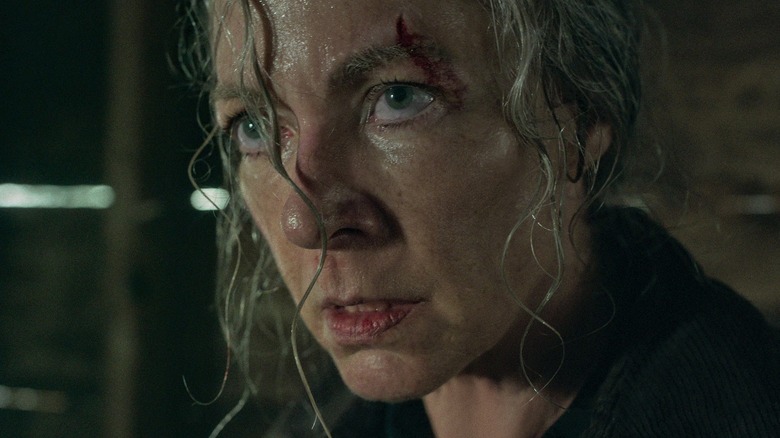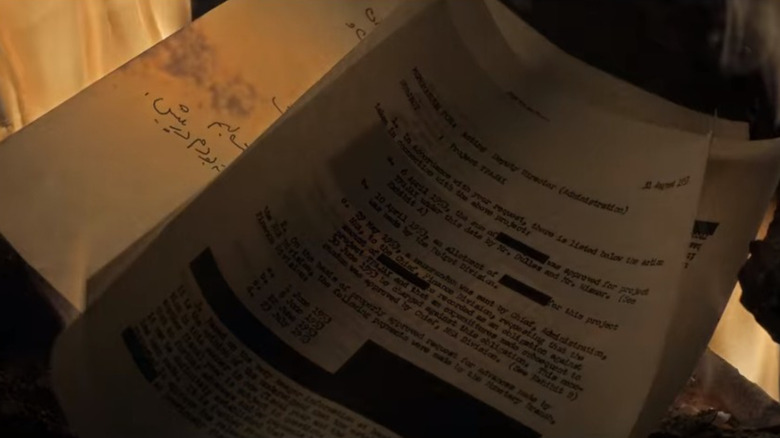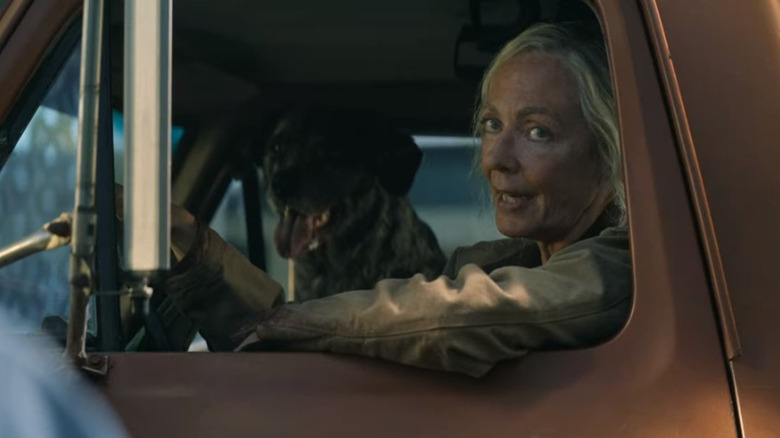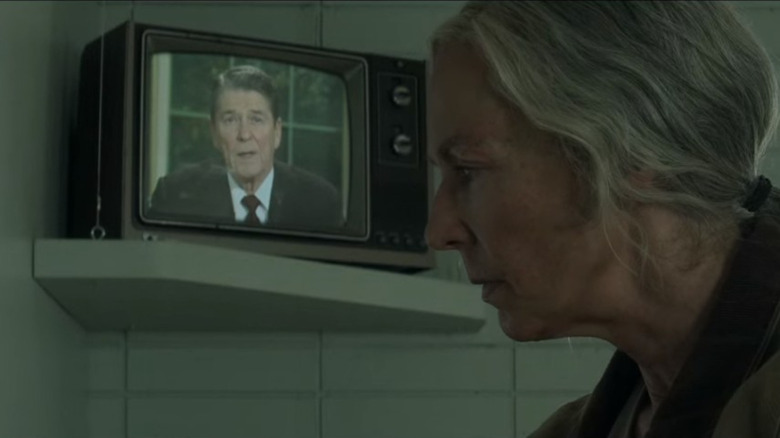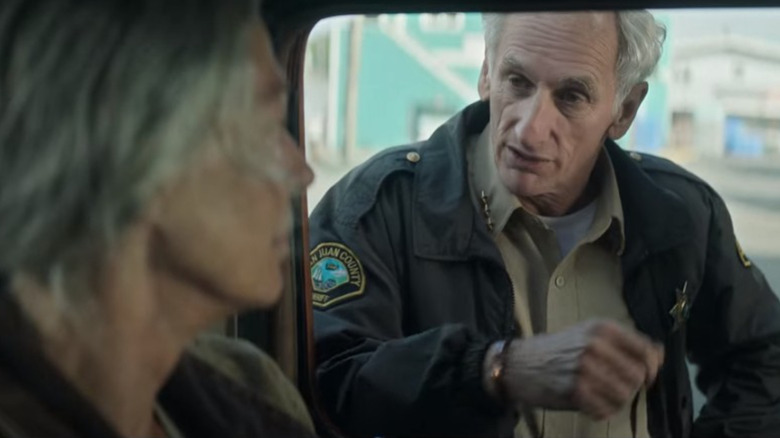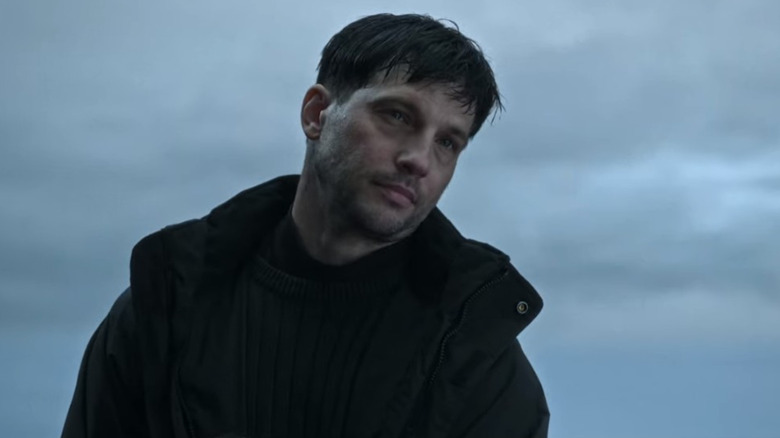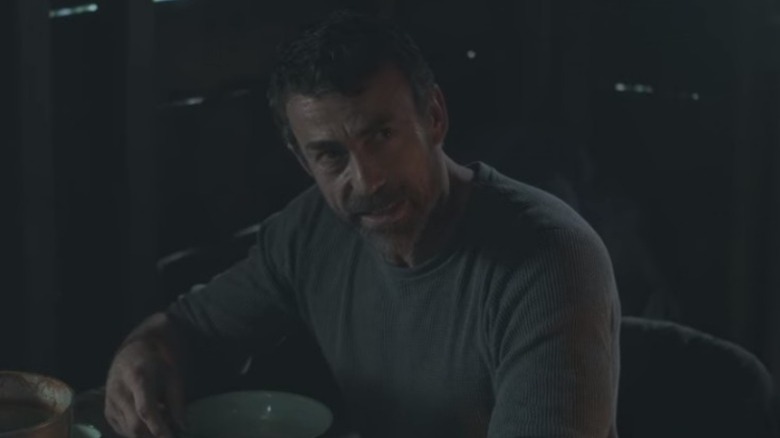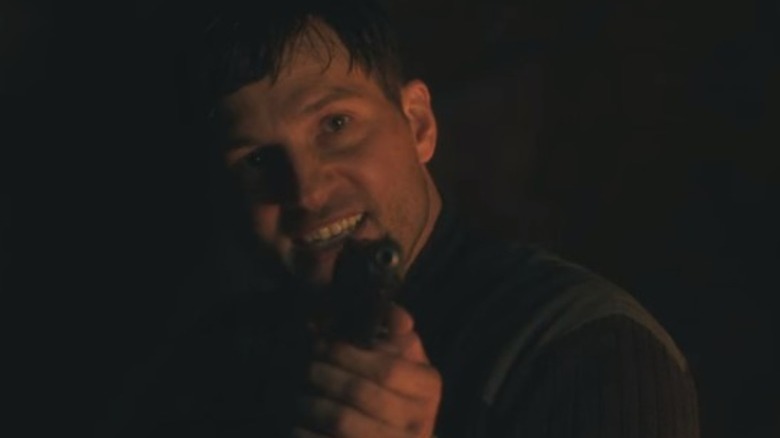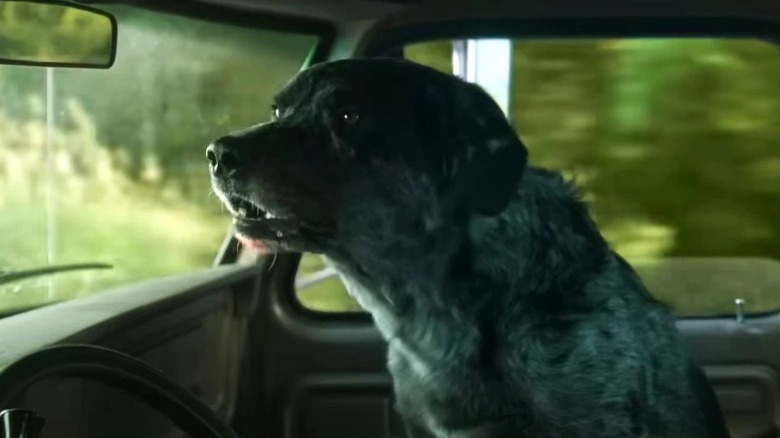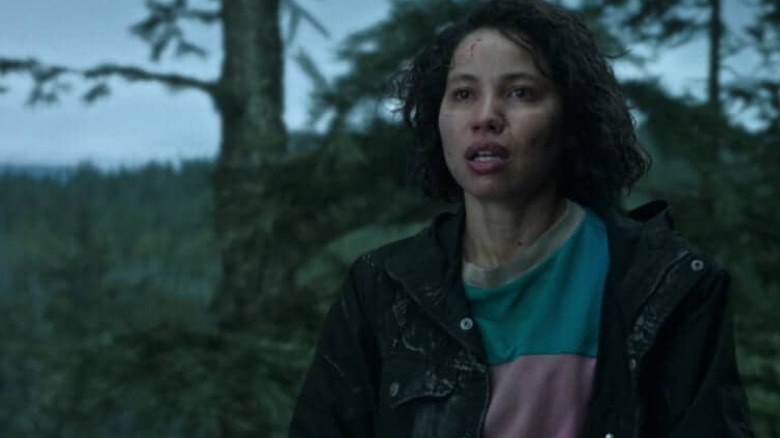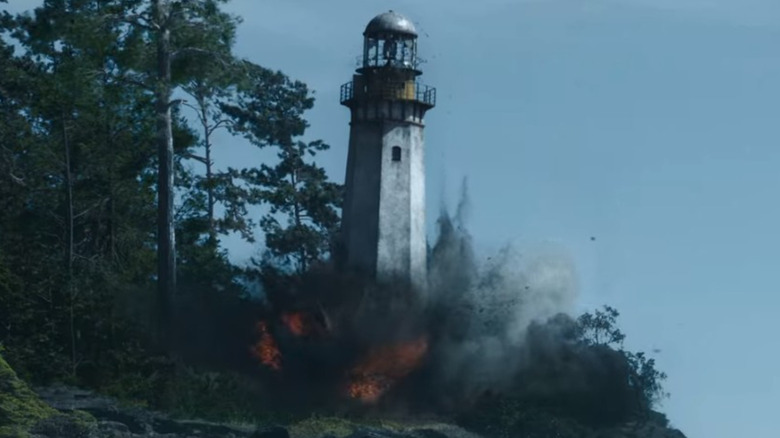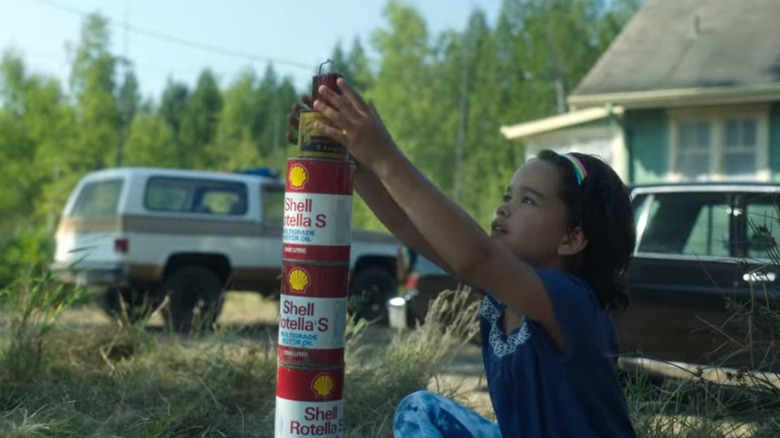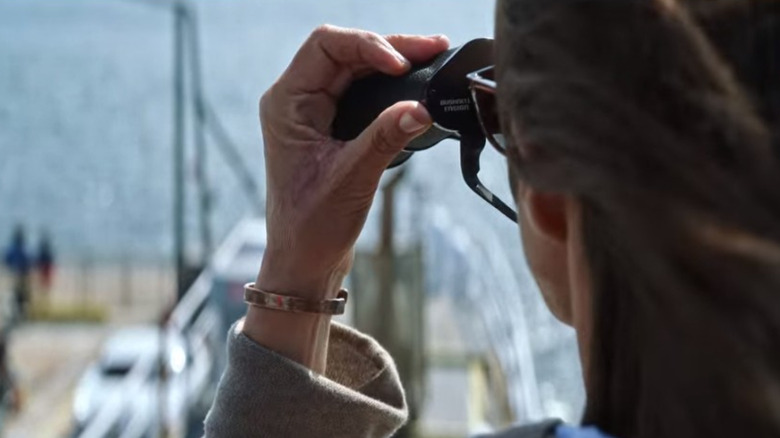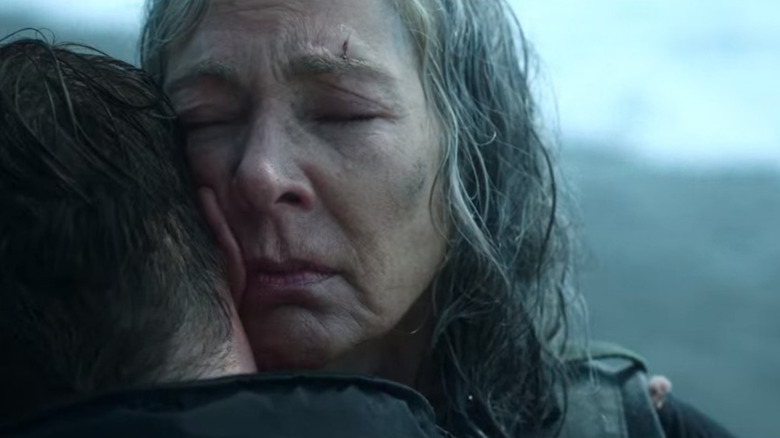The Ending Of Lou Explained
This post contains spoilers for "Lou."
In the new Netflix movie "Lou," Allison Janney gets ripped and gets her "Taken" on in a new spin on the "mysterious loner" action movie. But in addition to the welcome change of a female lead, "Lou" also brings strong emotional undercurrents and deep geopolitical relevance to a story that could easily just have been a straight-ahead survival tale. Janney shines as the title character (leaving her perky, comedic persona in movies like "10 Things I Hate About You" far behind), and is ably supported by Jurnee Smollett as Hannah, Lou's put upon single mother tenant. When Hannah's daughter is captured, Lou and Hannah team up to fight bad guys and the elements as a storm barrages their small island off the Pacific Northwest coast.
Director Ana Foerster ably balances visceral action scenes with the harrowing relentlessness of the storm — in just her second movie as director after "Underworld: Blood Wars," it's clear that her long experience as a second unit director and cinematographer on Roland Emmerich movies like "The Day After Tomorrow" and "10,000 B.C." is brought to bear. But for all it's gripping tension, "Lou" also tells a relatively twisty story about regret, legacy, and parenthood that might be a little confusing to catch every subtlety of at first. This is the ending of "Lou," explained.
The 1953 coup in Iran
Where a lot of action movies just kind of hand wave at vague, shadowy government work to explain why the main character is so deadly, "Lou" gets specific. She was a CIA operative for 26 years, and was directly involved the 1953 coup in Iran. In a role that the CIA admitted to officially by declassifying documents 60 years later, the CIA worked in concert with British intelligence forces, Iranian mobsters, and the clergy that supported the monarchal rule of Shah Mohammad Rez Pahlavi in order to overthrow the democratically elected Prime Minister Mohammad Mossaddegh.
As a field agent, Lou's role involved "getting very close to a very dangerous man," as she explains to Hannah, which eventually resulted in a pregnancy. She kept the baby to avoid blowing her cover, and her son Philip (played by Logan Marshal-Green as an adult) was at least briefly taken from her by his father's men at some point. "Lou" is set sometime in the mid-'80s, when the government is still actively denying its role in Iran, and this secrecy defines much of Lou's life. The documents she burns as the film opens are proof of U.S. involvement in the coup, and the lasting psychological damage to Philip will haunt her much more directly.
'Rent -- tomorrow'
As "Lou" opens, the main character is at the end of her metaphorical rope. With her son allegedly dead, she plans to take her own life and leave everything to her daughter-in-law and granddaughter (Hannah and Vee), who she has secretly manipulated into living on her property without revealing her own connection to them. There's a moment, well before we understand any of this, when Lou seems on the verge of saying something to Hannah, but she passes it up and resolves to take her secrets to the grave.
It's a mark of how hostile and alienated a life of solitude has made Lou that one of her theoretically final acts is insisting that Hannah pay rent the next day. Even over Hannah's protests about having to buy supplies to weather the storm, Lou insists "no exceptions" can be made, seemingly just to ensure that Hannah discovers Lou's body and letter the next morning by coming inside to leave the rent on the table. Even in what she plans to be her last day on Earth, Lou doesn't think to spare Hannah the stress of raiding her daughter's college fund to afford rent the next day.
If you or anyone you know is having suicidal thoughts, please call the National Suicide Prevention Lifeline by dialing 988 or by calling 1-800-273-TALK (8255).
What's Reagan talking about on TV?
The brief clip of Ronald Reagan on television in "Lou" allows us to place "Lou" specifically in time as taking place the night of November 14, 1985. The local news is reporting on a national address that Reagan gave the night before addressing a shipment of arms to Iran and the subsequent perception that the arms were in exchange for hostages released as part of the then-ongoing Iran-Contra scandal. "Lou" plays with history a little bit by having the local anchor claim that Reagan is "addressing heightened tensions with Iran in the wake of rumors about the CIA's involvement with the 1953 coup..."
In reality, those rumors had persisted for decades and were nothing new. Lou does claim that she blackmailed the CIA into investigating Philip's actions in El Salvador, and it's very possible that leaking the existence of the documents to the press had something to do with it. Whatever the specifics, the glimpse of Reagan on the news is a grim reminder for Lou that the biggest operation of her career led to decades of instability in Iran, whatever its intentions were, and in 1985, the country had a more fractured relationship with the U.S. than ever. As she contemplates her legacy, Lou has many reasons to believe that she left the world a more dangerous place than she found it.
The copper bracelet
When Lou's hand cramps up and causes her and Hannah to fall from a perilous rope bridge, it pays off an earlier scene when Lou scoffed at the advice of the kindly Sheriff Rankin (Matt Craven). In a scene that mostly exists to plant the idea of Lou's arthritis, Rankin had recommended she get a copper bracelet to relieve the effects, an idea that Lou rejects out of hand. When it comes back to haunt her, it seems like yet another way that Lou's misanthropy and distance from people has sabotaged her.
But all research indicates that it's a myth that copper eases joint pain. According to Arthritis.org, it's only the placebo effect that has led people to believe that copper and other treatments like magnets can influence blood flow. So, although it's an endearing gesture when Rankin finds a badly-wounded Lou and places a bracelet around her wrist near the end of the movie, it does nothing for her pain ... but it's a good thing she finds another use for it.
What was Philip up to in El Salvador?
Like mother, like son. Just as Lou was part of U.S. intervention in Iran, her son Philip grows up to become a Green Beret in the United States Army Special Forces, and is presumably among the first soldiers sent to El Salvador in the early '80s to train the El Salvadorian military in "counterinsurgency techniques." Much like the United States' motivations in Iran and later Vietnam, U.S. intelligence feared that leftist insurgencies would lead to the spread of communism. Philip was born into the traumatic context of his mother's undercover operation in Iran and carried her legacy of interventionism on in a big way.
Philip apparently got a little too hands on in his time in El Salvador, and he is eventually court martialed at some point: Hannah claims to have seen the transcripts that indicate "he was torturing hostages for fun." As haunted as Lou is by her experiences, Philip has fully shed his humanity and embraced the sociopathic side required for the job. In a literal way, Lou has to confront her own past and fight the monster than she created.
Tony and Gerry
Pour one out for Tony (Daniel Bernhardt) and Gerry (R. J. Fetherstonhaugh), Green Berets who served with Philip dispatched unceremoniously and brutally by Lou. "Just as vicious" as Philip, according to Hannah, they were apparently loyal enough to him to accompany him on his mission to kidnap his daughter. But that loyalty didn't run both ways: Philip brought them for extra muscle, but didn't think to give them a heads up, like, "Hey, just so you know, my mother is an ex-CIA spy that stops at nothing." When Lou pulls the helpless old lady routine to get into their cabin, Tony barely figures the ruse out in time to have a fighting chance.
Obviously, Philip is a psychopath on a quest for revenge, but you have to wonder why he even needed his two military buddies tagging along in the first place. He approaches Lou's property on foot, kidnaps Vee himself, and then leaves Tony and Gerry behind at a cabin to... do what, exactly? Philip likely expected them to get killed, since the cabin had another note taunting Lou. After all their time in El Salvador, Tony and Gerry were used as mere pawns in a family dispute.
The big twist
"Lou" does a relatively incredible job of foregrounding the big twist that Lou is Philip's mother, without entirely giving it away. Bit by bit, the clues pile up, like the postcards that he leaves along the way with references to Iran. At first, it seems illogical that he kidnaps Vee during a huge rainstorm, making it more or less impossible to get away, but when the truth comes out you realize: He wanted it this way. With outside help cut off, he knows his mother will pursue him to the lighthouse, where they can have a final confrontation.
This explains why he blew up Lou's car as well, although he nearly blew up Lou and Hannah as well when they tried to start it right as the timer was about to run out. The remote island that Lou presumably chose as a form of defense was turned into a prison, by a combination of Philip and bad weather.
What happened to Jax at the lighthouse?
Unlike many movies where the hero has a loyal dog, Lou's hunting companion Jax never really gets involved in the action. He accompanies her and Hannah through the storm until they reach a half-collapsed rope bridge that he's unable to cross with them, and Lou orders him home, with "no arguments." Jax obediently retreats, but later finds Lou when she's badly hurt on Eagle Bay. When she steals Sheriff Rankin's ATV and rides off for a final showdown with Philip, Jax is running on the beach alongside her.
But in one of the film's few continuity errors, he's nowhere to be seen in the last section of the movie. As a viewer you spend part of the final fight on the beach between mother and son braced for Jax to intervene at a crucial moment, but he never does. Knowing the danger, Lou likely ordered him home a final time off-screen before the confrontation, where he greets Hannah and Vee on their eventual return.
Hannah's struggle to survive
Although it doesn't have a lot of downtime to devote to exploring the psychology of it, "Lou" gives the character of Hannah agency and empathy not normally seen in stories of domestic abuse. When Lou "discovers" the story of her marriage to Philip, she initially scolds Hannah for staying with him so long: a comment made even more callous when you realize that Lou didn't just learn about it, and is partially responsible for Philip's detachment and cruelty.
But even under duress, Hannah rightly reprimands Lou for judging a situation from the outside, and gets her to admit that the reality is more complicated. Despite being married to a monster, Hannah did manage to get herself and her daughter out — even though Philip threatened to murder the three of them — and was even moving on with her life romantically before Philip reappeared to try and make good on that promise. And at the lighthouse, Hannah's method of telling Vee "game on" to get her out of harm's way pays off, and she summons the courage to badly wound Philip, putting him and Lou on more or less even ground for the showdown on the beach.
If you or someone you know is dealing with domestic abuse, you can call the National Domestic Violence Hotline at 1−800−799−7233. You can also find more information, resources, and support at their website.
Calling for help
In addition to living undercover and deadly skill in hand-to-hand combat, Lou's time with the CIA also left her with some improvisational wizardry in the vein of MacGyver. When she and Hannah are trapped with Philip's bomb in the basement of the lighthouse, she's able to change the radio frequency on the detonator to buy them the time to escape. And as she's limping away from the lighthouse with Philip not far behind, she pulls out her most impressive trick.
Taking the copper bracelet that Sheriff Rankin just put on her wrist, a bit of spare wire from the lighthouse, and a large stick, she makes an antenna without breaking stride. Then she calmly asks for Hannah's radio, finds the right frequency, and blows up the lighthouse to get the attention of the CIA helicopter circling the island in pursuit of Philip and herself. She keeps Philip busy just long enough in a final, brutal fight among the waves for the helicopter to riddle him with bullets.
The legacy of oil
After the chaos and bloodshed, "Lou" fades to a happy ending. But the first shot of the denouement is a potent reminder of the geopolitical forces that Lou was part of in the '50s: Vee innocently stacks some Shell brand motor oil cans as she plays in the yard. In addition to fears about communism spreading to Iran if left to its own devices, the desire to "keep the oil flowing" was a prime motivator for the U.S. and Britain taking part in the coup d'état.
In Vee, "Lou" reminds us that the large and shadowy forces that topple governments have personal and intergenerational consequences. Vee has a dead father, a traumatized mother, a grandmother presumed dead (and at the very least a fugitive from the government), and a lifetime of dealing with the harrowing events of her kidnapping to look forward. You wouldn't know it from the smile on her face, but "Lou" sneaks in a visual reminder that day to day life in America is the indirect result of a long history of international strife.
A stranger on the ferry
In the final shot, "Lou" confirms that our heroine survived, despite seemingly insurmountable odds. After using Philip's body as a human shield, she managed to elude a CIA helicopter circling directly overhead and escape into the woods despite a massive axe wound to the shoulder and several other injuries. She then successfully hid from the CIA for months while preparing to secretly follow Hannah and Vee as they move to Seattle to start a new life.
The copper bracelet on her wrist implies very directly that Sheriff Rankin aided and abetted her hiding from authorities — he told Vee earlier his second bracelet was "for a friend." But even with the entire local Sheriff's department, it seems like it would be difficult to elude the combined forces of the CIA and the U.S. Marshalls on a manhunt for so long. Lou has apparently dyed her hair brown and started wearing glasses, which must have been enough to fool them.
Lou's future
What's most stunning about Lou's survival, even beyond the general unlikeness of it, is that she's chosen life after all. She begins the movie ready to end things, and seems to accept her death in a more benevolent way when the helicopter is approaching on the beach. But somewhere along the way, she's renewed her commitment to Hannah and Vee and continues to watch over them. As Hannah told her, everything she had was right there in front of her.
It's unclear what kind of future Lou will faces: In reality, the CIA wouldn't declassify documents relating to the Iran coup until 2013, so Lou has another three decades of being a top priority for them. Based on how long she's evaded capture so far, she might be able to assume another identity in Seattle and make her family aware she survived, but they might be under surveillance for a long time based on the events of the movie. With any luck, Lou can blackmail the CIA into leaving her alone with the threat of exposing the documents: As the audience, we're the only ones aware that she actually burned them.
